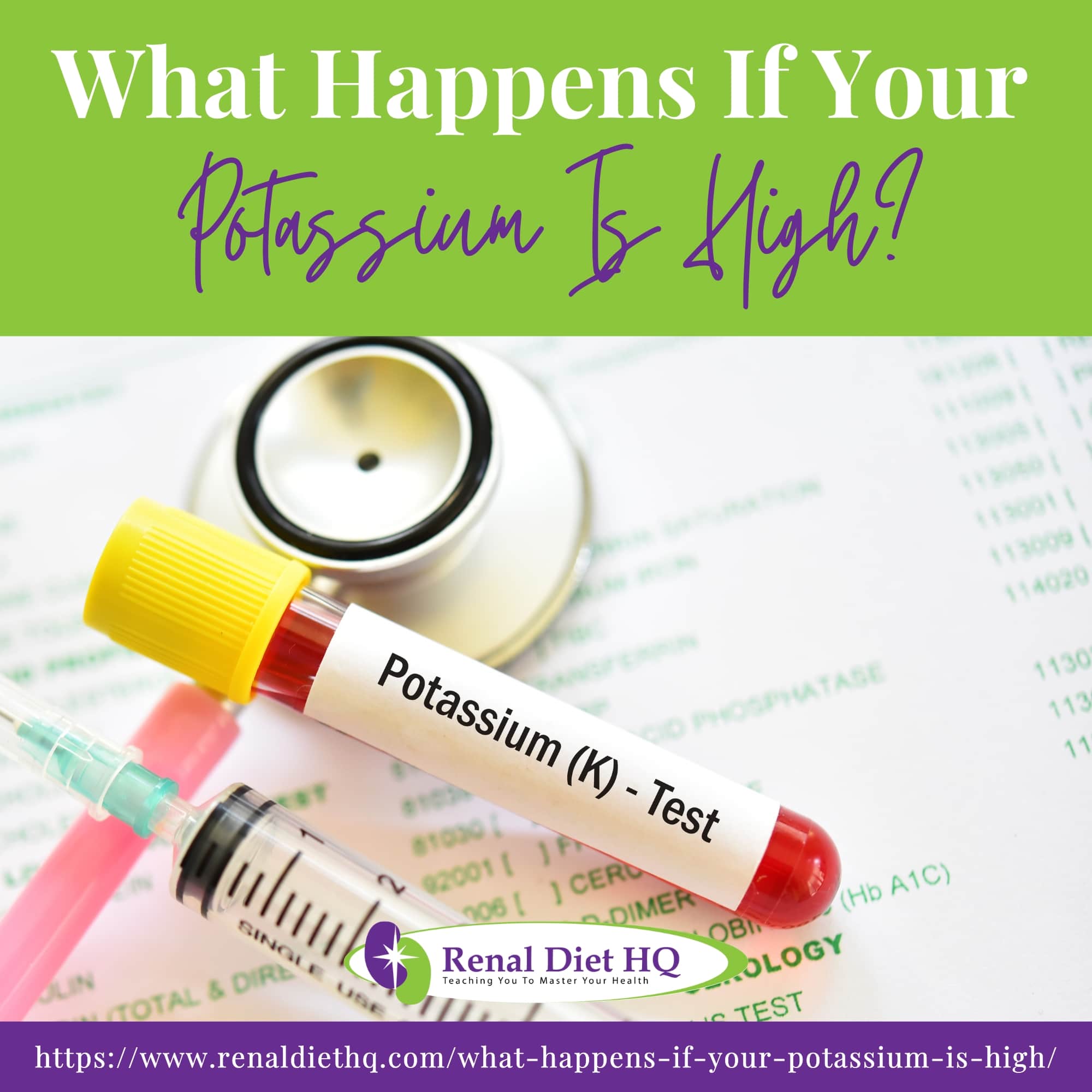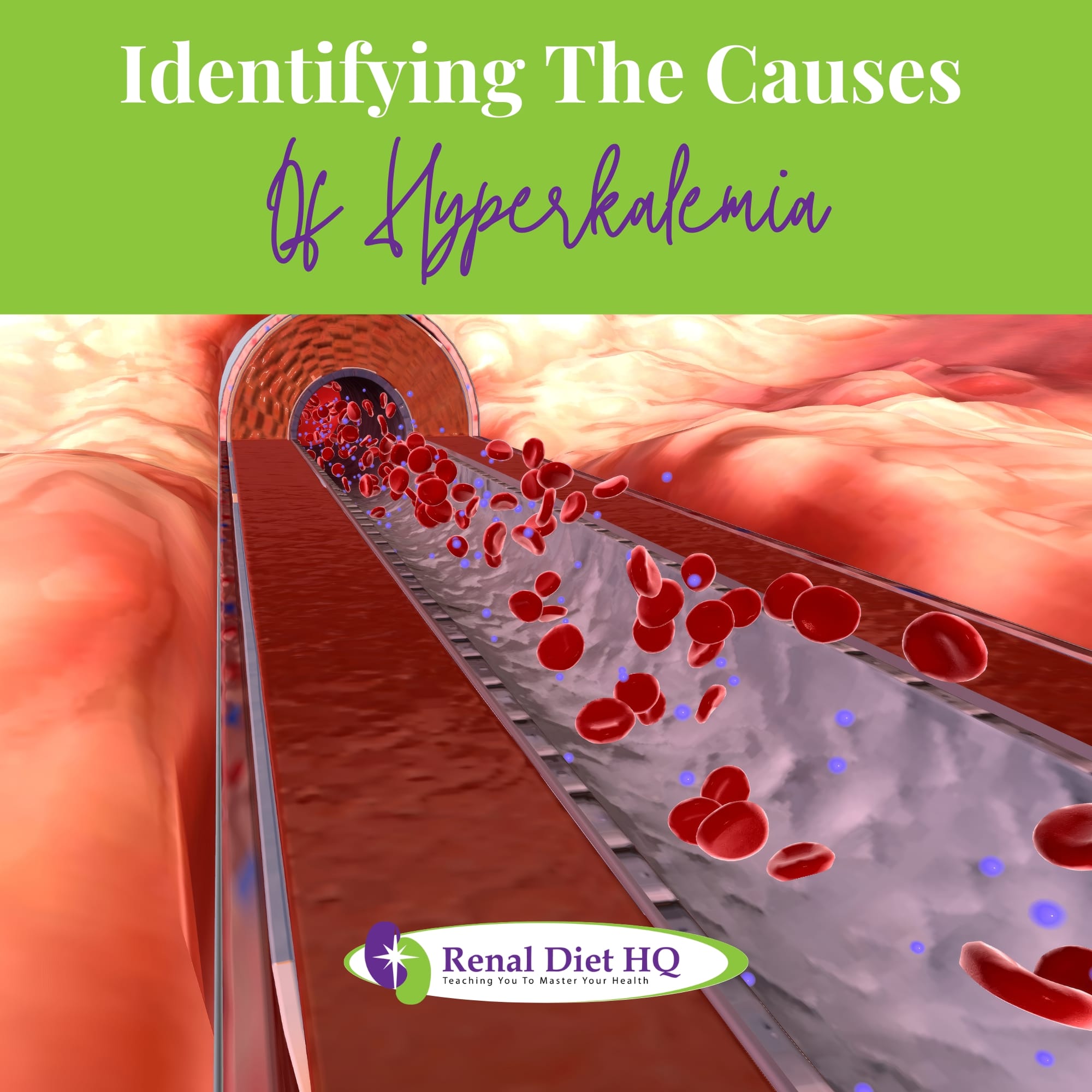What Happens if Your Potassium Is High?
High potassium levels in your blood, a condition known as hyperkalemia, can pose serious health risks. Potassium is a vital electrolyte that plays a crucial role in various bodily functions, particularly in nerve and muscle activity, and maintaining a stable heart rhythm.
When these levels become elevated, it can lead to a cascade of issues, from heart arrhythmias to muscle weakness and even life-threatening complications.
This article explores the causes, symptoms, potential complications, and crucial steps for managing and preventing hyperkalemia. Understanding what happens when your potassium is high is essential for maintaining your overall health and well-being.

Jump to:
- Key Takeaways
- How Chronic Kidney Disease Affects Electrolytes Like Potassium
- Understanding the Impact of High Potassium Levels
- Identifying the Causes of Hyperkalemia
- Recognizing the Symptoms of Hyperkalemia
- The Process of Diagnosing Hyperkalemia
- Effective Treatment Strategies for Hyperkalemia
- Frequently Asked Questions
- High Potassium Levels Can Be Dangerous
Key Takeaways
- High potassium levels can have a negative impact on heart health, including dangerous heart rhythms, heart palpitations, increased risk of arrhythmias, and elevated blood pressure.
- High potassium levels can disrupt proper muscular contraction, leading to muscle weakness, spasms, and irregular contractions.
- Elevated potassium levels can result in nerve damage, diminished sensation, cognitive impairment, neuropathic pain, and sensory disruptions.
- Hyperkalemia can be caused by kidney disease, medication-related factors, and may require lifestyle modifications, dialysis, or kidney transplantation for management.
How Chronic Kidney Disease Affects Electrolytes Like Potassium
Chronic Kidney Disease (CKD) casts a profound impact on the body's delicate balance of electrolytes, particularly potassium. Normally, our kidneys play an indispensable role in maintaining electrolyte equilibrium. However, CKD disrupts this balance, subjecting individuals to a host of health risks.
In this section, we delve into how CKD disturbs the regulation of potassium, the consequences of such disturbances, and strategies to manage this critical aspect of kidney health. Understanding these dynamics is paramount for CKD patients and those involved in their care.
Normal Potassium Regulation
In a state of optimal kidney health, potassium regulation is a meticulously orchestrated process critical for maintaining the body's overall well-being. Healthy kidneys perform this task with remarkable precision. These organs continuously filter blood, selectively retaining essential nutrients while eliminating waste products, including excess potassium.
Approximately 90% of the potassium in the body is excreted by the kidneys. Specialized cells in the kidney tubules, known as principal cells, control this fine balance by responding to hormonal signals, particularly aldosterone. When blood potassium levels rise, these cells respond by reabsorbing less potassium, leading to its excretion in urine.
Conversely, when potassium levels are low, the kidneys increase reabsorption, conserving this vital electrolyte. This intricate process ensures that blood potassium levels remain within a narrow and crucial range, facilitating proper muscle and nerve function, cardiac rhythm, and overall health.

Potassium Handling in Damaged Kidneys
Chronic Kidney Disease significantly disrupts the normal regulation of electrolytes, such as potassium, by the kidneys. The kidneys play a vital role in maintaining electrolyte balance in the body, and when CKD is present, this balance is compromised. Normally, the kidneys filter excess potassium from the bloodstream, preventing its accumulation.
In CKD, however, the kidneys gradually lose their ability to excrete potassium efficiently. This can lead to hyperkalemia, a condition characterized by high levels of potassium in the blood. Elevated potassium levels can disrupt the electrical impulses that control muscle and nerve function, potentially resulting in life-threatening cardiac arrhythmias.
The impaired regulation of potassium in CKD is primarily due to a decline in glomerular filtration rate (GFR), which reduces the kidney's ability to filter and eliminate excess potassium. As CKD progresses, so does the risk of hyperkalemia, necessitating strict dietary management, medications, and, in severe cases, dialysis to control potassium levels. Effective management of potassium imbalance in CKD is crucial to prevent life-threatening complications and maintain overall health.
For More Recipes and Ideas --->> Get Your Free Meals and Recipes That Are Perfect for Pre-Dialysis Diets, Pre-Dialysis with Diabetes, or Dialysis Diets.
Understanding the Impact of High Potassium Levels
When you have extra potassium in your body, it can significantly affect your heart health, muscle function, and nerve function.
High potassium, or hyperkalemia, can lead to dangerous heart rhythms and may also impair your muscles' ability to work properly.
Additionally, it's important to note that your nervous system, which relies heavily on a careful balance of potassium, can be disrupted by these elevated levels.
Effects on Heart Health
Elevated potassium levels, or hyperkalemia, can have severe consequences on heart health in the context of Chronic Kidney Disease. The kidneys, in their declining function, struggle to effectively eliminate excess potassium from the bloodstream.
High potassium levels disrupt the delicate balance needed for normal cardiac function. Excess potassium can lead to a condition called cardiac arrhythmia, where the heart's electrical signals become irregular. This can result in potentially life-threatening conditions like ventricular fibrillation, which may cause sudden cardiac arrest.
Furthermore, hyperkalemia can weaken the heart muscle and may contribute to heart failure. In CKD, where cardiovascular issues are already prevalent, the impact of high potassium levels on heart health is particularly dangerous. Managing potassium intake and closely monitoring blood levels is essential for preventing these severe cardiac complications in CKD patients.
Role in Muscle Function
Hyperkalemia, the condition of having abnormally high levels of potassium in the bloodstream, can profoundly affect muscle function. Potassium is an essential electrolyte responsible for maintaining proper muscle contraction and nerve function.
When potassium levels rise significantly, as often happens in Chronic Kidney Disease due to impaired kidney function, it can lead to muscle weakness, cramping, and in severe cases, paralysis. Hyperkalemia disrupts the delicate balance of electrolytes needed for muscles to contract and relax effectively.
This can lead to muscle fatigue, tremors, and, in extreme cases, even life-threatening muscle dysfunction. Managing potassium levels through dietary restrictions and medications is vital for CKD patients to prevent these debilitating effects on muscle function.
Impact on Nerve Function
Hyperkalemia can also have profound effects on nerve function. In healthy individuals, nerves rely on a precise balance of electrolytes, including potassium, to transmit electrical signals efficiently.
When the amounts of potassium become excessively high, as often occurs in Chronic Kidney Disease, it can disrupt this delicate equilibrium. Hyperkalemia can lead to nerve dysfunction, causing symptoms like tingling, numbness, and even muscle weakness. Severe cases of hyperkalemia can lead to more serious neurological issues, including paralysis or irregular heart rhythms that can impact the brain.
Hence, it's crucial for CKD patients to closely monitor and manage their potassium levels to safeguard their nerve function and overall well-being.

Identifying the Causes of Hyperkalemia
Let's now turn our attention to what might cause high potassium levels, or hyperkalemia.
Various factors can contribute to this condition, including the impact of kidney disease, the influence of your diet, and the potential side effects of certain medications.
Understanding these causes will empower you to manage your potassium levels effectively.
Kidney Disease Impact
Chronic Kidney Disease is a progressive condition where the kidneys' ability to filter waste and maintain electrolyte balance becomes impaired. This can lead to hyperkalemia, a state of elevated potassium levels in the blood when you have advance kidney disease.
In healthy individuals, the kidneys play a crucial role in regulating extra potassium by excreting excess amounts through urine. However, in CKD, kidney function deteriorates, and this regulatory mechanism becomes compromised. As a result, the kidneys are less effective at removing potassium from the bloodstream. Additionally, the acid-base balance in the body is disrupted in CKD, causing potassium to shift from cells into the bloodstream.
These factors collectively contribute to the accumulation of potassium in the blood, leading to hyperkalemia. Managing potassium intake and undergoing treatments like hemodialysis are essential for CKD patients to prevent and address hyperkalemia-related complications.
Dietary Influence
Diet, particularly the consumption of high-potassium foods, can play a significant role in the development of hyperkalemia. Hyperkalemia is characterized by elevated levels of potassium in the bloodstream and can be especially problematic for individuals with impaired kidney function, such as those with advanced kidney disease.
High-potassium foods, including bananas, oranges, orange juice, spinach, and potatoes, are rich sources of this essential mineral. In individuals with healthy kidney function, excess potassium is efficiently excreted through urine. However, in CKD, the kidneys often lose their ability to regulate potassium levels effectively. This can lead to potassium buildup in the blood. Consuming high-potassium foods in such cases can tip the balance and result in hyperkalemia.
This condition can have serious consequences, including irregular heart rhythms, heart attacks and muscle weakness, highlighting the critical importance of dietary management, which involves limiting high-potassium foods, for individuals with CKD to prevent hyperkalemia and its associated health risks.
Medication-Related Causes
Hyperkalemia, elevated levels of potassium in the blood, can be induced or exacerbated by certain medications, posing a particular concern for Chronic Kidney Disease (CKD) patients who already have compromised kidney function.
Medications that can contribute to hyperkalemia include potassium-sparing diuretics, often referred to as water pills, (e.g., spironolactone and amiloride), which reduce potassium excretion, and angiotensin-converting enzyme (ACE) inhibitors and angiotensin receptor blockers (ARBs), commonly used to manage high blood pressure.
These medications can alter the balance of electrolytes, including potassium, by inhibiting its excretion. Non-steroidal anti-inflammatory drugs (NSAIDs) may also affect kidney function, leading to potassium retention.
For CKD patients, the kidneys are less effective at filtering potassium, making these drugs riskier. Therefore, healthcare providers closely monitor potassium levels and often adjust medications or recommend alternative treatments to mitigate the risk of hyperkalemia in CKD patients. Patients with CKD should always consult their healthcare professionals for guidance on medication management to prevent hyperkalemia and its potential complications.
Recognizing the Symptoms of Hyperkalemia
Knowing how to recognize the symptoms of hyperkalemia is crucial to your health. Let's start by discussing the signs of mild hyperkalemia and then proceed to the more severe symptoms.
We'll also talk about how these symptoms can progress over time.
Identifying Mild Hyperkalemia Signs
Mild hyperkalemia, or elevated levels of potassium in the blood, can be asymptomatic, meaning it often doesn't present noticeable symptoms.
However, when symptoms do occur, they can be subtle and might include muscle weakness or occasional tingling sensations. Patients may experience irregular heartbeat patterns, such as palpitations, which can be concerning. Additionally, mild hyperkalemia can lead to a sense of fatigue or general weakness.
It's important to note that these symptoms may not be exclusive to hyperkalemia and could be associated with various other health issues. Furthermore, individuals with mild hyperkalemia may not display any symptoms at all.
Given the potential seriousness of hyperkalemia, it is essential for those at risk, especially those with chronic kidney disease, to undergo regular monitoring of their potassium levels and consult with healthcare providers to prevent the condition from worsening.
Severe Hyperkalemia Symptoms
Severe hyperkalemia, a dangerous condition marked by dangerously high levels of potassium in the blood, can result in a range of severe symptoms. These include profound muscle weakness or paralysis, often starting in the legs and potentially affecting the respiratory muscles, making breathing difficult.
Patients might experience abnormal heart rhythms, leading to palpitations or even cardiac arrest. Nausea, vomiting, and diarrhea can occur, leading to dehydration. Tingling sensations or numbness can extend to more severe neuropathy, affecting the nerves. Severe hyperkalemia can also impact the gastrointestinal tract, causing potentially life-threatening complications.
As these symptoms can rapidly progress to critical conditions, prompt medical intervention is essential. Individuals with known risk factors for hyperkalemia, especially those with chronic kidney disease, should closely monitor their potassium levels and work with healthcare professionals to manage this condition effectively.
Symptoms Progression Over Time
Hyperkalemia symptoms can escalate as the condition worsens. In its early stages, individuals may experience mild symptoms or none at all. As potassium levels rise, initial signs might include muscle weakness, tingling sensations, and palpitations.
In moderate hyperkalemia, more pronounced muscle weakness, fatigue, and irregular heartbeats can develop. Severe hyperkalemia leads to profound muscle weakness or even paralysis, potentially affecting respiratory muscles, resulting in breathing difficulties. Abnormal heart rhythms become more dangerous, possibly leading to cardiac arrest. Gastrointestinal symptoms like nausea, vomiting, and diarrhea can worsen, causing dehydration.
Ultimately, untreated severe hyperkalemia can have life-threatening consequences. The progression of symptoms emphasizes the importance of regular monitoring and timely intervention, especially for those at risk, such as individuals with chronic kidney disease or those taking medications that affect potassium levels.
The Process of Diagnosing Hyperkalemia
When suspecting hyperkalemia, your doctor will likely order a blood test, as it's crucial in determining your potassium levels.
Identifying the underlying cause of your high potassium is an essential step in the diagnosis process.
It's important that you fully inform your healthcare providers of all symptoms and medical history to ensure an accurate diagnosis.
Blood Test Importance
A blood test is indispensable for diagnosing hyperkalemia as it precisely measures the potassium levels in the bloodstream. Elevated potassium levels, especially in a clinical context, can be asymptomatic, and the symptoms may not manifest until the condition becomes severe.
Routine blood tests, including a basic metabolic panel or comprehensive metabolic panel, help detect hyperkalemia by assessing serum potassium concentrations. This diagnostic tool offers an accurate picture of an individual's electrolyte balance, facilitating the identification of hyperkalemia. In cases where underlying conditions, medications, or dietary habits contribute to hyperkalemia risk, regular blood tests are essential for early detection and monitoring.
Timely diagnosis through blood tests allows for prompt intervention and management, preventing potential complications associated with hyperkalemia.
Informing Healthcare Providers
Providing healthcare workers with an accurate medical history is of paramount importance in diagnosing hyperkalemia, particularly in individuals with Chronic Kidney Disease. Hyperkalemia can result from various factors, including medications, dietary choices, and underlying health conditions.
In the context of CKD, where the kidneys are already compromised, understanding a patient's medical history is vital. Certain medications, such as potassium-sparing diuretics or angiotensin-converting enzyme (ACE) inhibitors, can significantly increase the risk of hyperkalemia. Likewise, dietary habits, especially high-potassium foods, play a role.
A thorough medical history helps healthcare providers pinpoint potential contributors to hyperkalemia, guiding diagnosis and treatment decisions. Additionally, knowing the patient's CKD stage and overall kidney function assists in assessing the severity of hyperkalemia and tailoring interventions. Accurate medical history empowers healthcare workers to make informed decisions, optimize patient care, and mitigate the risks associated with hyperkalemia in CKD.
Effective Treatment Strategies for Hyperkalemia
Now that you're aware of how hyperkalemia is diagnosed, let's discuss effective treatment strategies.
This includes dietary changes, medication adjustments, and emergency management.
Each of these strategies can help manage your high potassium levels and alleviate the symptoms of hyperkalemia.
Dietary Changes for Hyperkalemia
Dietary changes are pivotal in managing hyperkalemia, a condition characterized by high levels of potassium in the blood. In individuals with Chronic Kidney Disease and other kidney-related issues, the kidneys struggle to excrete excess potassium efficiently, making dietary adjustments essential. Lowering potassium intake is a primary strategy.
This involves reducing or eliminating high-potassium foods like bananas, oranges, tomatoes, and potatoes. Instead, individuals are encouraged to consume low-potassium alternatives. Proper food preparation techniques, like soaking or leaching, can also help reduce potassium content in certain foods.
Furthermore, working closely with a healthcare provider or dietitian ensures a personalized dietary plan that balances nutritional needs while managing potassium levels effectively. Dietary management is a cornerstone of hyperkalemia treatment, complementing other interventions like medications or dialysis when necessary.
Medication Adjustments and Hyperkalemia
Managing hyperkalemia often involves adjusting medications to reduce the risk of elevated potassium levels. This is especially critical for individuals with Chronic Kidney Disease (CKD), as impaired kidney function can interfere with medication excretion. Medication adjustments may include:
- Potassium Binders: These drugs bind to potassium in the gut, preventing its absorption and facilitating elimination. Medications like sodium polystyrene sulfonate (Kayexalate) are commonly prescribed for CKD patients.
- Diuretics: Loop diuretics like furosemide can enhance potassium excretion through urine. Adjusting the dosage can help lower potassium levels.
- ACE Inhibitors and ARBs: These blood pressure medications may be discontinued or reduced in some cases as they can elevate potassium levels.
- Spironolactone: Reducing or eliminating this potassium-sparing diuretic may be necessary.
- Regular Monitoring: Frequent blood tests are crucial to assess potassium levels and guide medication adjustments, ensuring they remain within a safe range. Collaborating with a healthcare provider is vital to determine the most appropriate medication changes for each patient's unique condition.
Emergency Management of Hyperkalemia
The emergency management of hyperkalemia, particularly in the context of Chronic Kidney Disease, is a critical and time-sensitive process. Hyperkalemia can lead to severe cardiac complications, including life-threatening arrhythmias. Initial measures include:
- Cardiac Monitoring: Immediate electrocardiogram (ECG) is essential to assess the heart's electrical activity.
- Calcium Gluconate: Intravenous calcium gluconate or calcium chloride can help stabilize the cardiac membrane and counteract the risk of dangerous arrhythmias.
- Insulin and Glucose: Administration of regular insulin and glucose shifts potassium into cells, temporarily lowering blood levels.
- Sodium Bicarbonate: Intravenous sodium bicarbonate can be used to counteract acidosis and further reduce potassium levels.
- Diuretics: Loop diuretics may help enhance potassium excretion through urine, although they may be less effective in CKD.
- Emergent Dialysis: For severe cases, hemodialysis can rapidly and effectively remove excess potassium.
Prompt recognition and intervention are paramount in preventing cardiac complications. Collaboration with healthcare providers, including nephrologists and cardiologists, is vital for personalized, effective emergency management of hyperkalemia in CKD patients.
Frequently Asked Questions
Preventive measures to avoid high potassium levels are crucial, especially for individuals at risk, such as those with Chronic Kidney Disease. To maintain optimal potassium balance, it's essential to adopt a comprehensive approach. This includes adhering to a low-potassium diet by limiting high-potassium foods, staying well-hydrated to support kidney function, and monitoring potassium levels through regular blood tests. Managing underlying health conditions like diabetes or hypertension, which can exacerbate hyperkalemia, is equally important. Strict adherence to prescribed medications and dosages, along with caution regarding potassium-based salt substitutes, is vital. Being aware of the symptoms of high potassium levels and seeking medical advice promptly when they appear is part of a proactive strategy to effectively prevent and manage hyperkalemia.
Age can influence the risk of developing high potassium levels. Older individuals may be at a higher risk due to factors like reduced kidney function and multiple health conditions. Age-related kidney changes can affect potassium regulation. Additionally, older adults may have a higher likelihood of taking medications that impact potassium levels. However, the risk is not solely determined by age, as lifestyle, diet, and overall health also play significant roles. Regular monitoring and management of potassium levels are essential for individuals of all ages, particularly those with existing kidney problems or on medications that can disrupt potassium balance.
Yes, individuals should be cautious about high-potassium foods and drinks to prevent elevated potassium levels. Foods like bananas, oranges, potatoes, spinach, and tomatoes are potassium-rich and should be consumed in moderation, especially by those with kidney issues. Additionally, it's important to limit or avoid potassium-fortified or sports drinks. Controlling portions and seeking dietary guidance from a healthcare provider or dietitian can help maintain healthy potassium levels, particularly for those at risk of hyperkalemia, such as individuals with chronic kidney disease.
Yes, regular exercise can contribute to maintaining normal potassium levels. Physical activity can stimulate the release of potassium from cells into the bloodstream temporarily. This can be beneficial for those with healthy kidney function, as it may enhance potassium balance. However, individuals with kidney issues or taking medications that affect potassium should consult their healthcare providers. Exercise should be part of an overall health regimen, including a balanced diet, to help manage potassium levels, especially if you're at risk of hyperkalemia.
High Potassium Levels Can Be Dangerous
Chronic Kidney Disease profoundly disrupts potassium regulation. Normally, kidneys maintain electrolyte balance with precision, but in CKD, they lose this ability, leading to hyperkalemia.
Elevated potassium levels affect heart, muscle, and nerve functions. Symptoms can range from mild muscle weakness to severe paralysis and cardiac issues. A timely blood test is crucial for diagnosis, and providing an accurate medical history aids in pinpointing causes.
Management includes dietary changes, medication adjustments, and emergency interventions. Preventing high potassium levels involves a holistic approach, including diet control, hydration, and monitoring. Age and diet affect hyperkalemia risk, and exercise can help maintain potassium balance with healthcare guidance.














